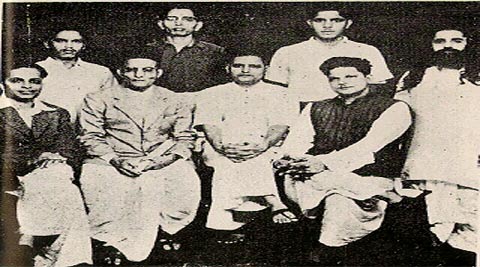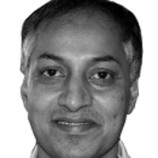
Shankar Kistayya, standing extreme left, was an accused in the assassination of Gandhi (Wikimedia commons)
92-year-old Kamalamma is one of the few living witnesses to Gandhi’s murder trial
 The young lady was just leaving the magistrate’s office to go home when a breathless attendant caught up with her to inform her that the sahib wanted her to return to his office. She was surprised, and a bit concerned — she had come here to meet Oscar Brown, chief presidency magistrate, Bombay, to get a domicile certificate that would enable her to apply for a job at a higher grade in government. The meeting had gone unexpectedly well. The Scotsman was delighted to hear she was born in Bellary, a town where he had spent several years, and was curious about how the place had changed over time. He had assured her that she would get the certificate. So, was there some unforeseen hitch?
The young lady was just leaving the magistrate’s office to go home when a breathless attendant caught up with her to inform her that the sahib wanted her to return to his office. She was surprised, and a bit concerned — she had come here to meet Oscar Brown, chief presidency magistrate, Bombay, to get a domicile certificate that would enable her to apply for a job at a higher grade in government. The meeting had gone unexpectedly well. The Scotsman was delighted to hear she was born in Bellary, a town where he had spent several years, and was curious about how the place had changed over time. He had assured her that she would get the certificate. So, was there some unforeseen hitch?
Back in the magistrate’s office, she found that he had a proposal for her. Just after she left his office, he had been asked to find a native Telugu speaker, since Shankar Kistayya, one of the accused in the murder of Mahatma Gandhi, required a court interpreter during the course of the trial. Brown had immediately thought of her as a possibility (educated, fluent in Telugu and English, a government employee), and so asked her if she could go forthwith to Delhi. Kamalamma said she needed to inform her cousin and pack her clothes. The magistrate said he would send a constable ahead to her house, inform her cousins and bring them and her bags to the railway station while she did the necessary paperwork for being seconded to the trial.
The 26-year-old Kamalamma was nothing if not adventurous. Married off after she lost her father at age 13, she stayed on at home tending to her cancer-stricken mother, who encouraged her to complete school. After her mother’s death, she refused to consent to the marriage, and with the help of friends, went to Mysore’s Maharani’s College and studied psychology. In 1942, she had participated in the Quit India Movement, and had been arrested for picketing. Feisty, attractive and with a quick wit, she made an impression on her teachers and college contemporaries.
The trial was being held in one of the army buildings within the premises of the Red Fort. The proceedings were being presided over by Special Judge Atma Charan of the ICS. Kamalamma and many other staff members involved in the trial were accommodated in the same premises. The investigative officer, Deputy Commissioner of Police J.D. Nagarwala, had made proper arrangements for their accommodation and took good care of his assisting staff. The accused were also being held in one of those buildings, which had been designated a prison. This gave Kamalamma an opportunity to meet and talk with the accused outside the courtroom as well.
The prosecution was led by C.K. Daphtary, advocate-general of Bombay, assisted by lawyers Petigara and others, including a young J.C. Shah, whom Kamalamma was later to encounter when she worked for the solicitors firm Kanga & Co. A battery of lawyers from all parts of the country had been pressed into service in the defence of Savarkar, of whom she particularly recalls Bhopatkar, Mehta and a plump lawyer called Banerji. (When I asked her why the prosecution, the investigative team and others like her had been sent for from Bombay, she felt that this was because Sardar Patel did not have enough confidence in the police in Delhi — after all, they had not followed up on the earlier abortive attempt by the conspirators and had failed to prevent the assassination of his beloved leader — and also that the conspiracy had been hatched in the Bombay Presidency.)
Kamalamma is perhaps one of the few living witnesses to the trial, and one of the few women who had been part of the proceedings. Her outgoing nature enabled her to befriend some of the accused. She recalls with a chuckle how Digambar Badge demonstrated to her how he could smuggle a small pistol in his beard, or speak perfectly with a few coins under his tongue. Nathuram Godse she remembers as being very quiet. He had volunteered to commit the crime instead of his brother, since the latter was married. Gopal Godse and Narayan Apte had an intense hatred for Gandhi’s philosophy. Vishnu Karkare was open, friendly and chatty, and would often remark to her and others seated near her, during the course of the witnesses’ testimonies, whether what they said was true or not, even when it was sometimes inimical to their defence. Shankar Kistayya, for whom she was translating, knew little about the conspiracy and was merely Badge’s servant. He had perhaps felt that he should have a court-appointed interpreter out of a sense of importance and self-preservation. She didn’t think highly of Madan Lal Pahwa, saying that he seemed flattered by the public attention.
The abiding impression she had over the six or so months during which she was part of the trial in Delhi was that the conspirators and their supporters were extraordinarily keen to get Savarkar exonerated. She feels that Patel had good reason to suspect the involvement of a fanatical wing of the Mahasabha and that while Savarkar may not have been involved in the details of planning the assassination, the conspirators had certainly been inspired, if not instigated, by him.
courtesy : "The Indian Express", January 30, 2014
![]()

